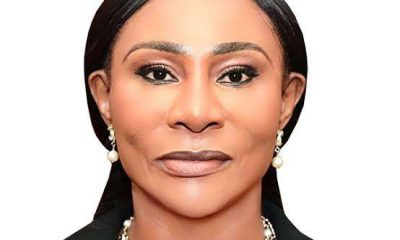Business
Panic in banks over new capital base policy

– To shop for additional N4trn, as CBN bans access to Shareholders’ fund
Deposit Money Banks (DMBs) operating in the country were caught napping by last Thursday’s announcement by the Central Bank of Nigeria (CBN) that the new capital requirement for financial institutions shall be restricted to paid-up capital and share premium, Business Hallmark findings can reveal.
According to information available to BH at the weekend, the financial institutions were unprepared for the seemingly stringent requirements announced by the apex bank despite having advanced knowledge of the planned exercise.
The CBN Governor, Yemi Cardoso, it would be recalled, had in a keynote address delivered at the Chartered Institute of Bankers of Nigeria (CIBN) 58th Annual Bankers’ Dinner and Grand Finale of the institute’s 60th anniversary in Lagos on November 11, 2023, said the apex bank would soon direct all financial institutions to increase their capital for them to effectively play their role in the $1 trillion economy President Bola Tinubu’s administration was targeting.
The CBN governor, however, failed to disclose the exact target the banks will be required to scale up to throughout his stay at the event.
However, many bank officials, financial experts and media houses, while lumping the now excluded banks Shareholders’ Fund together with their paid-up capital and share premium, had projected that many financial institutions, especially, Tier-1 banks, had already surpassed any figure that may be released by the CBN.
Their reasons were not farfetched. Before now, banks normally include their retained earnings, which they added to compute their shareholders’ funds.
For instance, the capital base of Nigeria’s seven biggest banks, namely Zenith Bank, Access Bank, UBA, Union Bank, GTBank, First Bank, First City Monument Bank (FCMB) and Fidelity Bank, as at the end of the 2022 financial year (shareholders’ fund inclusive), stood at N9.6 trillion.
Zenith Bank emerged as the most capitalised bank with N2.07trillion, followed by Access Bank with N1.92trillion. Also on the list are FBN Holdings N1.78trillion; GTCO N1.37trillion; UBA N1.35trillion; FCMB N494billion and Fidelity Bank N479billion capitalisation respectively.
Also, the remaining 22 banks were close to the N500billion mark, and will need to raise little funds for them to remain in business.
The erroneous N9.7trillion capital base for the seven big banks bandied around was calculated using the now excluded Shareholders’ Funds.
But on Thursday, March 28, 2024, the CBN announced the commencement of the much awaited recapitalization exercise, which mandates substantial increases in the minimum capital base of banks according to the scope of their operations.
According to the CBN’s Acting Director of Corporate Communications, Mrs. Hakama Sidi Ali, while commercial banks that want to get international licences will need to upgrade their capital base to N500 billion, national banks must capitalised to the tune of N200 billion, regional banks N50 billion, non-interest banks seeking national licence N20 billion and non-interest banks seeking regional approval N10 billion.
While stating that Shareholders’ Fund would not be considered, the Bank warned that new capital requirement will consist solely of paid-up capital and share premium.
It advised banks to consider raising fresh equity capital through rights issues, private placements, and offers for subscription, as well as pursuing mergers and acquisitions.
“The minimum capital shall comprise paid-up capital and share premium only and shall not be based on the Shareholders’ Fund.
“Additional Tier 1 (AT1) Capital will not be eligible for meeting the new requirement. Despite the increase in capital, banks must ensure strict compliance with the minimum Capital Adequacy Ratio (CAR) requirement applicable to their license authorisation”, the circular stated.
For those unable to meet the new threshold, they were advised to consider downgrading their license authorisation. Meanwhile, all banks are required to meet the minimum capital requirement on or before March 31, 2026.
As a result of the CBN’s unexpected review of the computation formula, Zenith Bank, which currently has a minimum capital base of N270.75 billion, will need additional N229.26 billion to scale the CBN hurdle, while Access Bank with a capital base of N251.81billion will need additional N248.19 billion to reach the new threshold.
Likewise, Ecobank, with a current capital of N353.51 billion, must raise N146.49 billion to remain an international bank, while First Bank of Nigeria Holdings (FBNH) Plc with N251.34 billion, must raise another N248.66 billion to retain its licence.
Likewise, GTBank with N138.19 billion capital base must scale up by another N361.81 billion; Fidelity Bank with N115.31 billion, will need to raise N384.70 billion; FCMB with N125.29 billion, must secure additional N374.71 billion in capital.
Of the big banks, the hurdle will be more tasking for UBA, which needs to raise additional N384.18 billion in addition to its current minimum capital of N115.82 billion.
In the same vein, national banks like Stanbic IBTC with N109.26 billion capital, will need to raise N90.74 billion to meet the minimum capital requirement of N200 billion, while Sterling Bank with N57.15 billion, must source for a whooping N142.85 billion to stay in the category.
Further analysis of the 27 commercial banks financial reports showed that they will need to raise N4 trillion combined to be able to meet the CBN’s new target.
However, most bankers and financial analysts were caught off guard by the new stipulation that existing banks’ minimum capital shall comprise of only paid-up capital and share premium only.
According to sources in the banks, apart from only Sterling Bank, which will need to raise more capital even with the old template, other banks executives are particularly angry because they thought they had surpassed the new threshold before the CBN disallowed them from retaining their earnings and accept it as part of share capital.
Some of the shocked bank executives, who spoke on the development kicked against the apex bank’s decision to omit retained earnings from the share capital calculation in its recapitalization guidelines.
According to the aggrieved bankers, who spoke on the condition of anonymity, because of a possible backlash from the regulatory authority, the decision to exclude retained earnings from share capital calculations is flawed.
“In accounting terms, retained earnings are considered a component of a company’s equity, because they represent profits that have not been distributed as dividends but are instead reinvested in the bank.
“So, the CBN is wrong in its decision to exclude retained earnings from share capital calculations, totally wrong!”, a top executive in one of the top banks fumed.
However, a senior editor in one of Nigeria’s leading business newspaper disagreed with the banks executives.
According to the top journalist, who is the managing editor of the newspaper house, CBN caught the banks in their game.
“Shareholders’ fund is not the banks’ money, it is retained profit, which should be paid out as dividend.
“But they keep it in anticipation of a time like this. It is not used to measure capital adequacy. Capital base is what determines the bank’s liquidity, and it’s against which deposits and credits are leveraged.
“But our banks prefer to warehouse their funds in shareholders’ fund to avoid raising their loan threshold to business in order to hedge their risks. They refuse to raise their paid up capital. No bank has fully paid up capital.
“So, what the CBN has done is to force them to raise their credit capacity threshold and compel them to pay out dividends, because the money is practically useless to them now”, the senior editor explained.
Meanwhile, some banks, BH reliably gathered, had somehow gotten wind of the new CBN’s capital requirement, and had long before now initiated move to recapitalize.
For example, Access Holdings, the parent company of Nigeria’s biggest bank, Access Bank, just hours before CBN’s announcement, said it was going to raise $1.8billion to expand its operations
At the investors call, the bank announced that it would raise $1.5billion or its naira equivalent through the issue of shares, bonds or other instruments to fund a five-year growth plan that began last year, while an additional N365billion ($257m) will be raised as through a rights issue, which date is yet to be announced.
Many observers believed that officials of the bank mist have gotten wind of the new benchmark, hence the resolve to go to the market.
“While will a bank (Access Bank) with a purportedly huge capital base of N1.92trillion just before the CBN announcement go to the market again to source for capital if not that its handlers are privy to the fact that the apex bank will not allow them include the Shareholders’ fund to compute the final number?
“I don’t believe it is a coincidence, not at all! I can understand Sterling, Wema or Fidelity suddenly going to the market to raise more funds. But there is no obvious reason for Access Bank to do that with almost N2 trillion in its kitty to play around with”, a source maintained.






